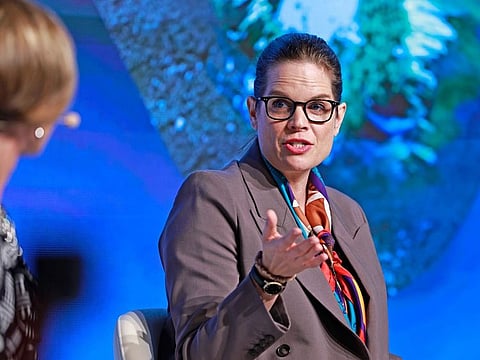COP28 UAE: A crucial turning point for climate action
There is no time to dither or delay on the ever-escalating climate crisis

Tens of thousands of people will soon arrive in Dubai for COP28. Most of those delegates are coming to drive ambition in the face of an ever-escalating climate crisis and an increasingly fragile multilateral world. As they do so, the message is clear: we simply don’t have the time left for a COP of dither or delay.
The organisation I lead – the Children’s Investment Fund Foundation – is one of the largest funders of climate action in the world, with offices in London, Beijing, Delhi, Addis, and Nairobi. We work as we do because the climate crisis is the single biggest threat to children’s futures.
That is why we have spent over a decade bolstering the COP process, whether that’s working to support progress in the formal negotiations or catalysing transformation on issues like decarbonisation and youth participation across the Action Agenda. That is why we provide technical assistance to partners like national and subnational governments, in countries like India and with partners like the India Global Forum, to support the development and delivery of ambitious climate action. And that is why, personally, I’ve engaged with the COP process for longer than I care to remember – most recently as a Friend of COP26 and an unpaid adviser to the COP28 Presidency.
Working together
In all this work, my team and I recognise that effective multilateralism and effective climate action needs every country and every voice.
So, it has been an honour to support the Prime Minister of Barbados, Mia Mottley’s Bridgetown Initiative. This initiative has set in motion a transformative vision of global reform, for climate and development finance, and for truly representative governance.
Leaders from across our ecosystem have worked tirelessly to put these issues on the desks of leaders and finance ministers around the world.
The V20’s Accra-Marrakech Agenda is a powerful example of that work. The Paris Summit was a critical waypoint on the journey.
And the Africa Climate Summit was an energising moment of further progress, particularly as Kenyan President William Ruto set out his ideas for African climate leadership. As the President said, Africa can and must be a leader in the global transition, once countries across the continent have equitable access to finance, based on a reasonable cost of capital.
Of course, India’s G20 Presidency built on all this work, setting a powerful platform for the forthcoming COP.
In fact, India’s G20 Presidency, which brought the African Union formally into the forum, was an exemplar of the power of Global South leadership, for advancing truly global action while prioritising critical issues as the just transition and ensuring modern, sustainable energy access for all. For supporting global efforts to mobilise the trillions needed, while ensuring that finance flows to the countries that need the most. And for showcasing and scaling innovative and sustainable South-led solutions.
Much of this progress was codified in the Delhi Declaration. The Declaration was the first G20 text to centre our foundational 1.5 degrees target. And the text’s push for a tripling of renewable energy and a doubling of energy efficiency improvements, both by 2030, sets a minimum bar for Parties in Dubai.
Looking to the UAE
As attention turns now to Dubai, a successful COP28 Presidency will be one that shepherds all parties and delegates to build on the work of recent months.
Given the trust deficit that currently casts a long shadow over the COP process, much will be dependent on developing countries first seeing progress on historic commitments that for too long have gone unmet. The effective establishment of the Loss and Damage Fund will be particularly important.
From there, as we arrive at the world’s centre of gravity for oil and gas production, we’ll also need to see a Presidency that rises to the challenge on fossil fuels. That work should include a commitment to fossil fuel phase-out, as the science demands. Within that, this COP is an opportunity to deliver a 1.5-aligned pathway for the oil and gas industry, and a mandatory agreement that moves us towards zero methane by 2030.
Even as the Presidency pursues these outcomes, work will also be needed to turn the noise surrounding our global climate town hall into a clear signal that moves us forward across the entirety of a truly inclusive and comprehensive Action Agenda, spanning the nexus of climate, health, trade, youth, gender, food, nature, energy, and finance.
Wrapping all those outcomes in a necessarily ambitious negotiated text and Global Stocktake decision will then be the final step, as we look beyond COP28 to the critical next round of Parties’ Nationally Determined Contributions.
The CIFF team and I will be in Dubai working with partners, like India and the India Global Forum, on all these issues. And we’ll be pushing relentlessly for progress. It is time for all of us to deliver the good news, for climate and for multilateralism, that the world so desperately needs.
– The writer is the the CEO of The Children’s Investment Fund Foundation, UK



